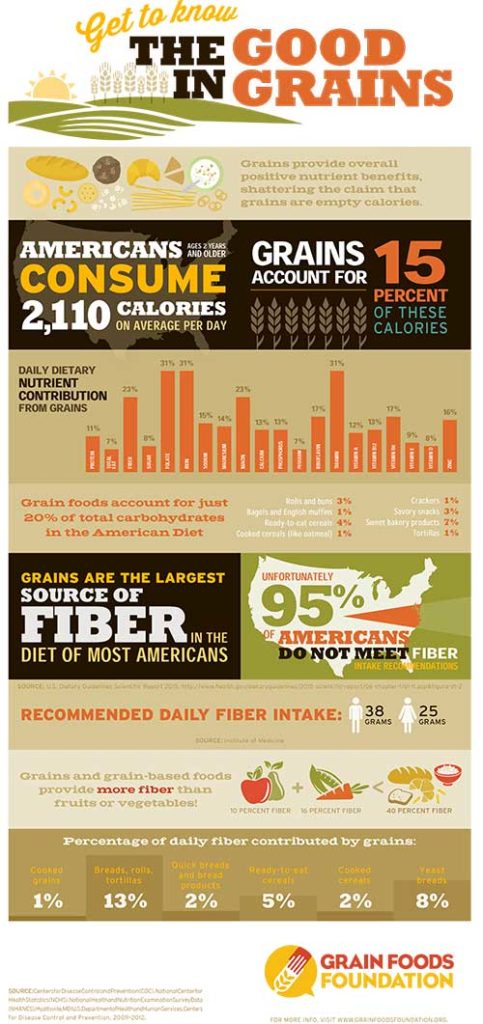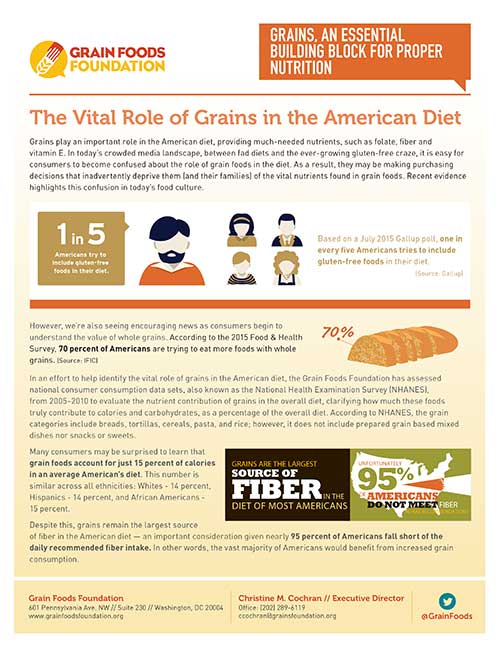Grain Foods Foundation Engages New Expert for Scientific Advisory Board
Enlists Obesity and Eating Behavior Expert to Guide Programming September 1, 2015 — Washington, D.C. — The Grain Foods Foundation is thrilled to welcome a new member to its Scientific Advisory Board, Richard Mattes, MPH, PhD, RD. Dr. Mattes is a Distinguished Professor of Nutrition Science at Purdue University, where he directs the university’s Public […]
Get to know the Good in Grains

Grains provide overall positive nutrient benefits, shattering the claim that grains are empty calories.
The Vital Role of Grains in the American Diet

Grains play an important role in the American diet, providing much-needed nutrients, such as folate, fiber and vitamin E. In today’s crowded media landscape, between fad diets and the ever-growing gluten-free craze, it is easy for consumers to become confused about the role of grain foods in the diet.
New Research Reinforces No Benefit To Gluten-Free Diet
Despite health claims for gluten-free eating from celebrities and the media, there is no evidence indicating the general population would be better off avoiding gluten. The gluten-free diet is an essential medical treatment for people affected by celiac disease, non-celiac gluten sensitivity and wheat allergy, but a literature review confirms there is no published experimental […]
Navigating the gluten-free boom: from essential medical treatment to ill-conceived fad diet
Despite health claims for gluten-free eating from celebrities and the media, there is no evidence indicating the general population would be better off avoiding gluten for weight loss in individuals without celiac disease, non-celiac gluten sensitivity and wheat allergy.
Whole-grain foods and chronic disease: evidence from epidemiological and intervention studies
There is increasing evidence from both observational and intervention studies that increased intake of whole grain foods has positive health benefits, including lower risk of developing cardiovascular disease, type 2 diabetes and some cancers. Whole grain consumers may also have better digestive health and are likely to have lower BMI and gain less weight over time.
Whole-grain products and whole-grain types are associated with lower all-cause and cause-specific mortality in the Scandinavian HELGA cohort
A study following a Scandinavian cohort demonstrated intake of whole grains was associated with a lower risk of mortality, indicating whole grain consumption is an important aspect of preventing early death.
Anemia prevalence may be reduced among countries that fortify flour
In a study examining data on anemia in countries that fortify flour (and those that do not), researchers found that every year a flour fortification program was in place was associated with a 2.4% decrease in anemia prevalence among non-pregnant women.
Dietary fibre and incidence of type 2 diabetes in eight European countries: the EPIC-InterAct Study and a meta-analysis of prospective studies
Fibre intake is inversely related to the risk of developing type 2 diabetes and cereal fibre found in grain foods, such as bread, rice and pasta, was found to be the most protective. Researchers found the protective effect of fibre intake on diabetes risk may be partially explained by body weight.
Genetic gains in agronomic and selected end-use quality traits over a century of plant breeding of Canada Western Red Spring Wheat
Researchers compared wheat grown from wheat seeds dating from 1860 to present day. They found that wheat grown today remains similar to ancient wheat in terms of protein and carbohydrate quality and concentration. This refutes critics claims that modern wheat has “changed” and is the cause of modern-day diseases such as obesity and type 2 […]
